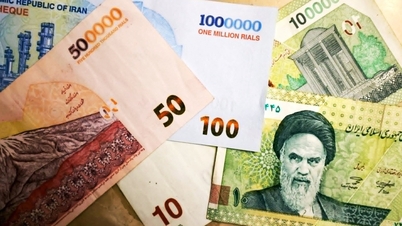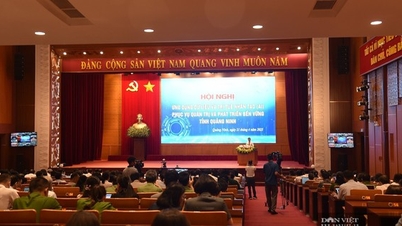
The TouristDigiPay program will help tourists convert cryptocurrencies into Thai baht for spending - Photo: AFP
Thailand's pilot project of the "TouristDigiPay" program, expected to launch in the fourth quarter of this year and last for 18 months, promises to bring a payment revolution to the tourism industry.
The program, which allows foreign tourists to convert cryptocurrencies into baht, is expected to boost spending by 10% and support local businesses amid a decline in international arrivals.
Technology serving tourism
The Thai government wants to promote innovation and support digital assets to stimulate the tourism industry, while providing convenient payment methods for foreigners, according to Finance Minister Pichai Chunhavajira.
"This new program adds an alternative initiative to the use of cash and credit cards by foreign tourists," The Nation quoted Mr. Pichai as saying.
The system operates differently from a conventional exchange. Visitors will convert digital assets into baht through operators regulated by the Thai Securities and Exchange Commission.
The money is then loaded into an e-wallet to pay using QR codes at shops, restaurants and even street vendors.
Tourists can also convert baht back to cryptocurrency, which is much more convenient than selling on an exchange and then transferring it to a bank account.
To manage risk, the program imposes strict limits: a maximum of 500,000 baht per month (nearly $15,400) at large businesses, dropping to 50,000 baht at smaller units.
Thailand also imposes strict requirements on opening new accounts and activating digital wallets to combat money laundering. If successful, the country may increase limits or allow the use of digital assets for high-value transactions such as real estate and yachts.
Thailand is not the only country using cryptocurrency in tourism. Bhutan has partnered with Binance to launch a payment system that accepts more than 100 cryptocurrencies for everything from flights, visas to shopping.
In the UAE, many airlines and travel agents accept Bitcoin, Ether in an effort to integrate blockchain technology into mainstream commerce.
Opportunities and challenges
Tourism accounts for about 12% of Thailand's GDP, and Southeast Asia's third-largest economy is struggling to attract international visitors from the Middle East and Southeast Asia as Chinese tourist numbers plummet.
Chinese tourists fell by a third in the first half of the year following the kidnapping of an actor near the Thai-Myanmar border, forcing Bangkok to lower its estimate from 37 million to 33 million. As of August 2025, the country welcomed just over 20.2 million visitors, down 6.9% from the same period last year.
Thailand estimates the policy will increase tourist spending by 10%. With about 35 million visitors a year, the program will generate an additional 175 billion baht (about 5.4 billion USD) for the economy.
Mr. Pichai emphasized that the program does not require credit card integration like other systems. "This benefits small retailers because they can accept payments as normal transactions, unlike foreign systems that link cryptocurrencies to credit cards that can only be used at large stores," he explained.
However, the program also poses risks, especially fraud and the instability of digital assets. "Most cryptocurrencies are illiquid, and I'm worried that locals could end up with worthless tokens, which would cause outrage," said Jan Wüstenfeld, a cryptocurrency expert at Paris-based Melanion GreenTech.
Thailand's Digital Vision
"Developing the digital economy along with tourism will create economic opportunities and attract more spending from tourists to Thailand, while laying the foundation for the country's complete transition to the digital age," said Lavaron Sangsnit, permanent secretary of the Thai Ministry of Finance.
The TouristDigiPay program marks a significant step forward in Thailand’s comprehensive digitalization strategy. In addition to strict anti-money laundering measures, the program opens up the possibility of expanding to other sectors if successful.
This reflects Bangkok's ambition to become a leading regional fintech hub, especially amid fierce competition to attract international tourists post-COVID-19.
Source: https://tuoitre.vn/thai-lan-don-dau-xu-huong-tien-dien-tu-du-lich-20250820075348914.htm





![[Photo] Discover unique experiences at the first World Cultural Festival](https://vphoto.vietnam.vn/thumb/1200x675/vietnam/resource/IMAGE/2025/10/11/1760198064937_le-hoi-van-hoa-4199-3623-jpg.webp)






























![[Photo] General Secretary attends the parade to celebrate the 80th anniversary of the founding of the Korean Workers' Party](https://vphoto.vietnam.vn/thumb/1200x675/vietnam/resource/IMAGE/2025/10/11/1760150039564_vna-potal-tong-bi-thu-du-le-duyet-binh-ky-niem-80-nam-thanh-lap-dang-lao-dong-trieu-tien-8331994-jpg.webp)
![[Photo] Opening of the World Cultural Festival in Hanoi](https://vphoto.vietnam.vn/thumb/1200x675/vietnam/resource/IMAGE/2025/10/10/1760113426728_ndo_br_lehoi-khaimac-jpg.webp)


































































Comment (0)